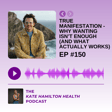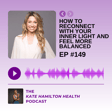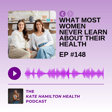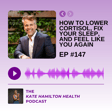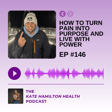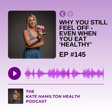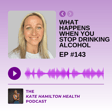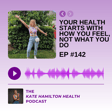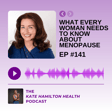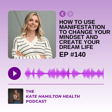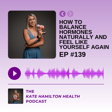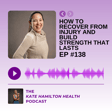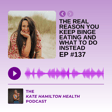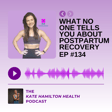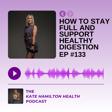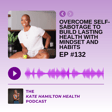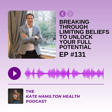
#126: Rebecca Nugent: Why fat loss finally sticks when you rethink nutrition, mindset and movement
Are you struggling to make healthy habits stick or wondering how to lose fat without obsessing over every bite? In this episode of the Kate Hamilton Health Podcast, I sit down with certified nutrition coach Rebecca Nugent, who shares how she lost 55 pounds and transformed her life by embracing a simple, sustainable approach to health.
Rebecca opens up about her journey from Ireland to Taiwan, how she shifted from teaching to coaching, and why consistency, daily movement, and mindset are key to lasting fat loss. We talk about the power of walking, eating more (not less!), and turning healthy habits into part of who you are - not just something you do. If you’ve ever felt stuck in the cycle of dieting and frustration, this conversation is your reminder that lasting change is 100% possible.
EPISODE HIGHLIGHTS:
[0:13] Meet Rebecca Nugent and her unique path from Ireland to Taiwan
[1:03] Why nutrition, mindset, and fitness are the three pillars of sustainable fat loss
[1:15] How Rebecca lost 55 pounds and changed her relationship with food
[1:22] Daily walking: the underrated fat loss tool
[1:31] Building identity-based habits for long-term success
[17:16] How coaching supports holistic, lasting transformation
[28:52] The surprising power of movement in maintaining results
[36:33] Restriction vs. freedom: how to eat more and still lose fat
[41:42] Knowing when to shift from fat loss to maintenance
[52:41] Why appreciating the little things fuels big change
Links & Resources:
- Connect with me on Instagram here
- Connect with Rebecca on Instagram here
- Learn more about KHH coaching here
If you enjoyed this episode, please subscribe, leave a review, and share it with friends who might benefit. For more health and fitness tips, follow me on Instagram and TikTok @katehamiltonhealth.
Music b LiQWYD Free download: hypeddit.com/link/xxtopb [http://hypeddit.com/link/xxtopb] Promoted by FreeMusicPromo [https://www.youtube.com/channel/UCbycji-eySnM3WD8mbxPUSQ] / @freemusicpromo
